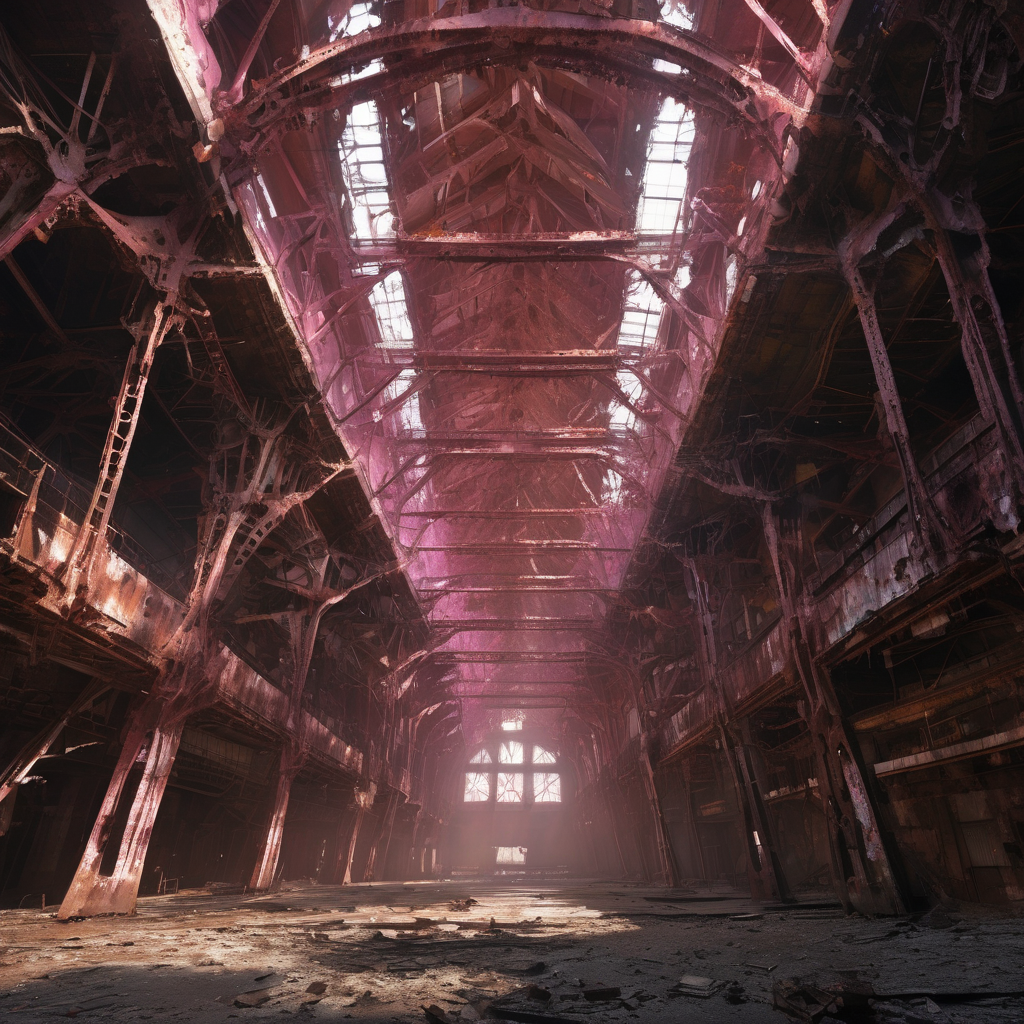The wind tasted of iron oxide. Elara sat on the slag heap, her perch overlooking the skeletal remains of the foundries, and ate her lonely meal. It was a girl dinner of the highest Sinterland order: a crust of black bread, a sliver of pickled turnip, and three sun-dried smelts, their tiny silver eyes staring into the perpetually bruised twilight. This was her inheritance, this vast graveyard of industry. Her grandfather, the patriarch of their little Roman Empire of slag and steel, used to say the rust was the land’s final blush. Elara thought it was more like a slow, open wound.
She hummed a low tune, a melody that vibrated in her teeth. It was an old song, one her mother had taught her, full of grating semitones and dissonant falls. A song for coaxing things apart. Outsiders, the few who strayed into the Sinterlands for scrap or morbid curiosity, would probably think her belief was pure delulu. But Elara knew. She knew what lay beneath the corrosion.
A flicker of movement below caught her eye. A man, not one of the usual scavengers in their patched-up leathers. He wore a coat of dark, unblemished wool, the kind of quiet luxury that screamed of a world without rust. He moved with a surveyor’s purpose, his gaze sweeping over the derelict structures not for loose copper piping, but for something else. His obsession with the specific angles of decay was a definite beige flag, but it was a novelty she couldn’t ignore. She slid down the gravelly slope, her boots making no sound.
“They’re not dead,” she said, her voice raspy from the metallic air.
The man startled, turning to face her. He had a clean-shaven jaw and eyes the color of a winter lake. “I’m sorry?”
“The foundries,” she clarified, gesturing with her half-eaten fish. “They’re not dead. They’re changing.”
He offered a tight, polite smile. “They look fairly… decommissioned to me.” He was holding a small, smooth stone, turning it over and over in his gloved fingers.
“Everyone thinks of the rust as the end,” Elara said, moving closer, drawn by an odd sense of duty. “But it’s just a shell. A chrysalis.”
He paused his walking, his attention finally snagged. “A chrysalis for what?”
Elara took him to the grandest of the ruins, the place they once called the ‘Crucible Cathedral.’ Inside, the hollow shell of a smelting furnace gaped like a mouth. Decades ago, for a grand opening that was now less than a myth, they had painted it a garish, hopeful pink, a splash of forgotten Barbiecore in a world of ochre. Now, the pink peeled away beneath sheets of blooming, fractal rust.
“My great-grandmother sang to the iron ore,” Elara explained, her voice echoing in the cavernous space. “She sang the fire into it. My mother sang to the steel as it cooled. And I…” she trailed off, running her fingers along a particularly thick bloom of rust. It felt like coarse velvet. “I sing to what comes after.”
The man watched her, his polite skepticism warring with a dawning curiosity. “And what is that?”
Instead of answering, she began to hum again. It wasn’t a performance; it was a task. The notes were low and resonant, the kind of sound that doesn’t so much travel through air as it does through solid matter. It was the song from the slag heap, deeper now, more certain. It was a strange, intimate ritual, and the man’s silent observation felt almost like a parasocial intrusion on a sacred act.
For a long moment, nothing happened. The man’s polite smile began to return. Then, a single flake of rust, the size of a thumbnail, shivered and dropped from the furnace wall, landing with a delicate *tink*. Another followed. And another. Soon, a soft cascade of red-brown dust was falling around Elara, catching in her dark hair like morbid confetti.
She didn’t stop singing. Her voice rose, the canticle becoming a clear, piercing thing that vibrated through the metal skeleton of the building. The rust fell faster, not in flakes but in sheets, peeling away like old parchment to reveal what lay beneath.
It was not metal.
Where the pink-and-rust furnace had stood, there was now a structure of pearlescent, luminous white. It was bone. Not the bone of any animal, but a new substance, formed from the memory of the steel. It held the shape of the furnace, yet it was porous, webbed in intricate patterns like the inside of a bird’s wing. It was a fossil of a machine, a testament of rust and bone.
The man stared, his mouth slightly agape. The smooth stone had fallen from his hand. He took a hesitant step forward, reaching out a trembling, ungloved hand to touch the impossible structure. His quiet luxury seemed foolish here, his orderly world a lie.
“I’m a geologist,” he whispered, his voice thin with awe. “I study transformations. Fossils. The memory of the world. I thought I was in a situationship with the past, just observing it from a distance.” He looked from the bone-furnace to Elara, her face grimy but illuminated by the strange, soft light of her creation. “But this… this is a new mineralogy. This is a song.”
Elara’s humming finally faded, leaving a silence that felt heavier and more profound than the noise it had replaced. The wind still blew outside, still tasted of iron, but a new note had been added to the air—the clean, chalky scent of bone. A canticle had been sung, and the land had answered. They stood together in the hollow cathedral, two strangers bound by a shared, impossible secret, watching the last of the rust settle like dust upon a tomb.

Leave a Reply